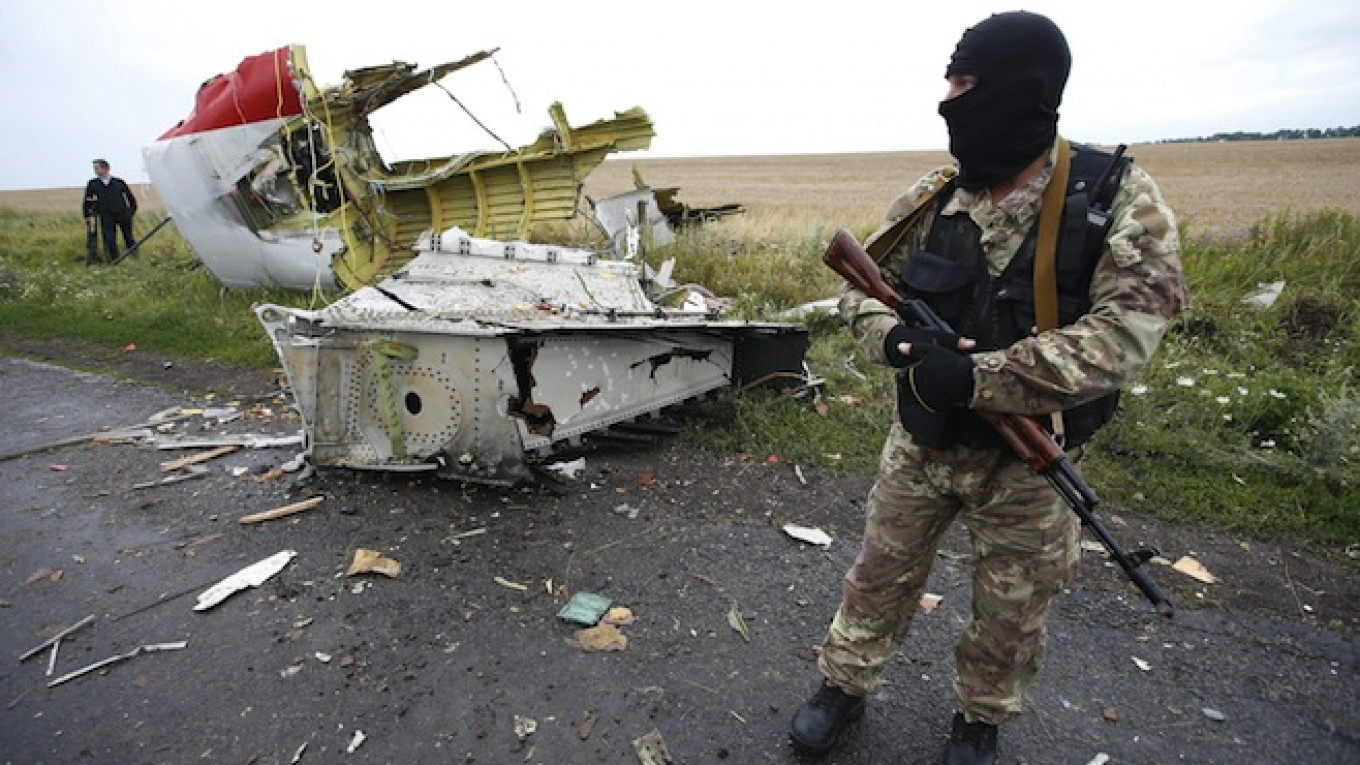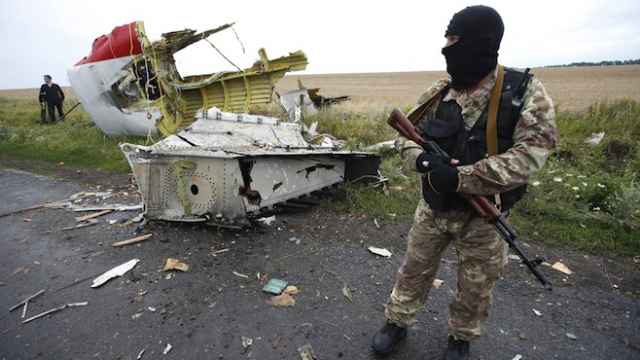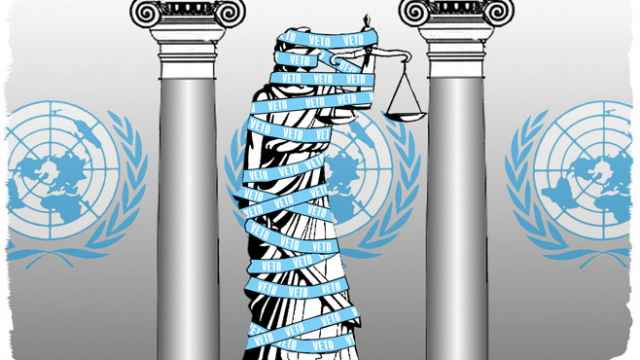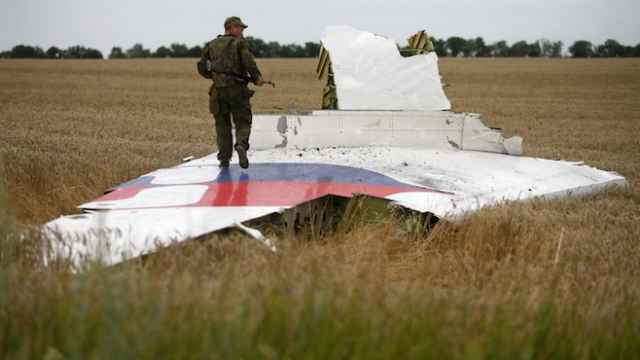Countries investigating the downing of a Malaysian airliner over eastern Ukraine last year have pledged to explore alternative paths for bringing the perpetrators to justice after Russia on Wednesday vetoed a UN Security Council resolution that would have established an international tribunal to try those responsible.
Moscow officials, including President Vladimir Putin, had previously indicated that Russia would veto the resolution, nevertheless, the five countries on the Joint Investigation Team looking into the crash and their allies expressed frustration after the vote.
"The recital of discredited contentions, and the anticipated excuses and obfuscation by the Russian Federation should be treated with the utmost disdain," said Australia's Foreign Minister Julie Bishop, who traveled to New York to rally support at the Security Council for the tribunal.
Eleven countries on the 15-seat council voted in favor of the draft resolution submitted by Australia, Belgium, the Netherlands, Malaysia and Ukraine. Russia was the only one to vote against; Angola, China and Venezuela abstained.
"A Legal Alternative"
Malaysian Airlines Flight MH17 crashed a year ago in a region of eastern Ukrainian under the control of pro-Russian separatists. All 298 people aboard were killed.
Most of the victims were Dutch, and the Netherlands' Foreign Minister Bert Koenders told the Security Council: "My country will not rest until all facts are known and justice has been served."
Koenders and Bishop, along with other envoys from the Joint Investigation Team and their allies have all pledged they would not be deterred by Russia's veto and would seek alternative routes.
"These five nations will stay together to find as quickly as possible a legal alternative," Koenders told reporters after the Security Council meeting.
Bishop told reporters that "there are clearly a number of legal options available, but it would be dependent upon what we were able to put in place: It might be a combination of countries, it might be a combination of legal systems."
Diplomats declined to elaborate, with Koenders saying: "It would be very unwise on the day that we heard a veto from the Russian Federation [to say]: OK, we have already a Plan B."
Although diplomats did not publicly list them on Wednesday, possibilities could include bringing charges at the International Criminal Court in the Hague, which prosecutes individuals for war crimes and crimes against humanity.
Another way around a veto by a Security Council member could — at least in theory — be offered by the rarely invoked General Assembly Resolution 377, which the United States pushed through in 1950 to set up a mechanism for bypassing possible Soviet vetoes.
Known as "Uniting for Peace," the resolution says that if the Security Council is too divided to ensure "international peace and security," the issue can be brought to the General Assembly. The resolution has been used less than a dozen times since it was adopted.
But unlike Security Council resolutions, those adopted by the General Assembly are difficult to enforce. One of them, passed by the assembly at a "Uniting for Peace" session in 1980, called for the withdrawal of Soviet troops from Afghanistan — but Moscow kept its forces there for another nine years.
Russian Objections
Russia's UN Ambassador Vitaly Churkin cast his country as the only one acting openly in its bid to pursue justice, saying that examples of Moscow's cooperation include sharing with Dutch investigators the "satellite data" the Russian Defense Ministry had released at a briefing shortly after the MH17 downing.
But the satellite images — which the ministry used to blame the downing on Ukrainian forces — were exposed earlier this year as "digitally modified using Adobe Photoshop CS5 software" by a group of independent British investigators.
In contrast to Russia's supposed openness, Churkin argued, "as for the criminal investigation, it is conducted by the members of the Joint Investigation Team in a closed format."
"What reason can there be in this case to be assured of an unbiased nature of such an investigation?" he said.
Moscow argued that establishing a tribunal would be "premature" until the investigation into the MH17 crash is completed, and would open the way for using the inquiry for political ends.
Churkin had also claimed earlier this month the issue would be outside the Security Council's mandate, but the council has established other international tribunals in the past without a Russian veto.
Ireland's Deputy Permanent Representative tho the UN Tim Mawe argued that "the establishment of such a tribunal in advance of the completion of the investigation would not represent an anomaly or a precedent — in fact it would be a continuation of established practice. "
"All other similar ad-hoc tribunals, such as were established in the wake of conflicts in the former Yugoslavia, in Rwanda and in Lebanon, were established prior to the completion of their respective investigations," Mawe said.
Diplomats also argued that establishing a tribunal before the results of the investigation are known would help ensure fairness.
The Dutch Safety Board is expected to release investigation results in October.
Western governments, along with the Ukrainian government in Kiev, have accused the pro-Russian separatists in eastern Ukraine of shooting down Flight MH17 with a Russian-made Buk missile. Moscow has offered various alternative explanations for the plane's downing, and has denied accusations of supplying weapons and fighters to separatists.
Diplomatic Disdain
Russia's sole "nay" vote has also brought a flurry of the diplomatic "disdain" that Australia's Bishop called for.
"Russia's veto disrespects the victims and insults their families," British Ambassador to the UN Matthew Rycroft said.
U.S. Ambassador to the UN Samantha Power said "Russia has callously disregarded the public outcry in the grieving nations, the appeals of the families affected."
"It is tragic that Russia has used the privilege entrusted to it in order to advance international peace and security in order to frustrate international peace and security," Power told the Council. "But let us be clear: today's veto cannot — and will not — deny the victims and their families justice."
The veto has also brought renewed criticism of Russia's use of its powers on the Security Council.
"One has to question the veto being used today in this way on this day," Bishop told reporters.
New Zealand's Foreign Minister Murray McCully, whose country holds the Security Council presidency this month, said "New Zealand has opposed the veto consistently since 1945. And we oppose its use today. We as a Council simply have to find better ways of working together."
A Message from The Moscow Times:
Dear readers,
We are facing unprecedented challenges. Russia's Prosecutor General's Office has designated The Moscow Times as an "undesirable" organization, criminalizing our work and putting our staff at risk of prosecution. This follows our earlier unjust labeling as a "foreign agent."
These actions are direct attempts to silence independent journalism in Russia. The authorities claim our work "discredits the decisions of the Russian leadership." We see things differently: we strive to provide accurate, unbiased reporting on Russia.
We, the journalists of The Moscow Times, refuse to be silenced. But to continue our work, we need your help.
Your support, no matter how small, makes a world of difference. If you can, please support us monthly starting from just $2. It's quick to set up, and every contribution makes a significant impact.
By supporting The Moscow Times, you're defending open, independent journalism in the face of repression. Thank you for standing with us.
Remind me later.






